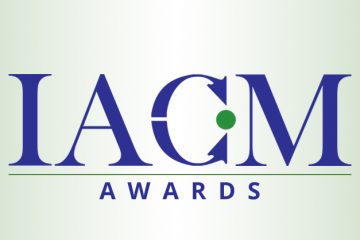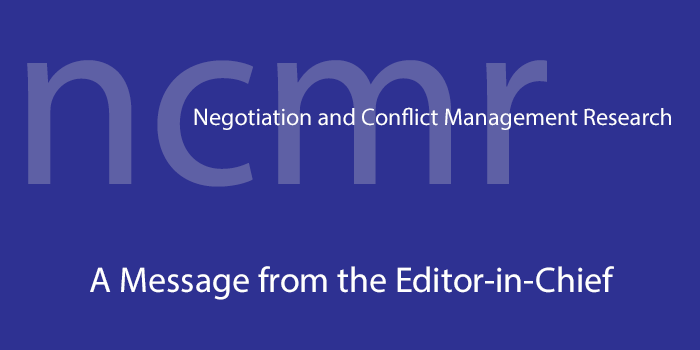Deb Shapiro on Receiving the IACM 2023 Lifetime Achievement Award Winner
 I feel honored and humbled to be the recipient of the International Association for Conflict Management’s (IACM’s) 2023 Lifetime Achievement Award. As such, I have been asked to answer four questions below. I realize, by doing this, how lucky I’ve been to study the research puzzles I have, to do this with great collaborators and with a variety of research methods, and to be part of a profession and scholarly community whose aim, like mine, is to help make our world a better (e.g., fairer, happier) place. Thanks to you all!
I feel honored and humbled to be the recipient of the International Association for Conflict Management’s (IACM’s) 2023 Lifetime Achievement Award. As such, I have been asked to answer four questions below. I realize, by doing this, how lucky I’ve been to study the research puzzles I have, to do this with great collaborators and with a variety of research methods, and to be part of a profession and scholarly community whose aim, like mine, is to help make our world a better (e.g., fairer, happier) place. Thanks to you all!
Question 1: Your colleagues who nominated you for this award describe your contributions to conflict and negotiation research as remarkable in how comprehensive and diverse they are. Broadly, across your projects (beyond a specific paper), what ideas do you consider your most important and why?
Answer:
Ideas from my work that I consider my most important include my illuminating:
(1) with Blair Sheppard and Lisa Cheraskin in our 1992 Negotiation Journal article that three types of trust exist: deterrence-based trust, compliance-based trust, and identity-based trust; and that identity-based trust is the most effective for encouraging mutually cooperative behavior;
(2) with Bob Bies (in our 1986 and 1987 publications in Academy of Management Journal, Communication Research, and Social Justice Research) that “interactional justice” (i.e., the extent to which people perceive others interpersonally treating them with dignity and respect)– called “interpersonal justice” in subsequent work by other justice scholars– influences how much fairness employees perceive at work;
(3) with Jeanne Brett (starting with our 1993 publication in Journal of Experimental Social Psychology) that grievants’ tendency to perceive more fairness when they have been given rather than denied the opportunity to express their views to a decision-maker (e.g., manager, arbitrator)— termed the “voice-effect”— is due to, BOTH, instrumental and non-instrumental motives (each more so in different circumstances that we theorized); and thus, should not be explained (as it was for many years) as due to one OR the other of these two motives;
(4) with Joel Brockner et al. (in our 2001 Journal of Experimental Social Psychology) that the “voice-effect” (described above) is not universal (as portrayed in the organizational justice literature) since this occurs significantly more often for employees with cultural values that are egalitarian (low in power distance) rather than authoritarian (high in power distance);
(5) with Mary Ann Von Glinow and Jeanne Brett (in our 2004 Academy of Management Review article) that the typical advice by conflict management/negotiation scholars for people (e.g., teammates) to talk about their emotional tensions calls for direct communication, which is contrary to the indirect communication-norms more often found in Eastern world regions; and thus, there is need for indirect communication-strategies for resolving emotional conflict in multicultural teams (which we identify);
(6) with my former Ph.D. student Brad Kirkman (via our 1997 Academy of Management Review and 2001 Academy of Management Journal articles) that employees’ typically positive reactions to being assigned to self-managing work teams (SMWTs), referred in subsequent work by other scholars as empowered teams, are weaker for employees located in some rather than other country-locations due to these country locations tending to be associated with (four types of) cultural values enhancing resistance to self-managing tasks and/or team-based tasks;
(7) with Jeanne Brett and Anne Lytle (in our 1998 Academy of Management Journal article) that conflict spirals (typically described in the conflict management literature as unbreakable until mutual destruction) can be broken and, even, redirected into mutually cooperative exchanges when dispute resolving-dialogues are characterized by (among other strategies) mostly “interest-oriented remarks” or by remarks that combine an interest-oriented remark with a “rights-” or “power-oriented” remark; and
(8) via my 1991 Administrative Science Quarterly article, 2011 Journal of Applied Psychology article, and in press article at Journal of Management that people’s tendency to harshly evaluate and punish transgressors (e.g., liars) is weaker when people perceive altruistic motives for others’ deceitfulness and perceive transgressors to be beloved and/or high-statured leaders.
Question 2: Would you be willing to pull back the curtain on one or two of your prominent research papers? What inspired the project? What challenges did you face?
Answer:
My research is often inspired: (1) by my desire to improve theory, perspectives, and/or empirical tests of theories in ways that seem needed (e.g., the need to recognize “interactional justice,” to recognize the Western-bias of the “voice-effect,” and more) and/or (2) by news-related events that evoke passion (e.g., concern) in me. For example, news events of governmental- and corporate-leaders responsible for scandals for which they, unlike their subordinates, are not punished, have inspired most of my transgression-related studies.
Research-related challenges I have faced include: (1) a coalminer strike occurring during the field experiment involving a sample of coalminers, which delayed this study with Jeanne Brett that resulted in our 1993 Journal of Personality and Social Psychology (JPSP) publication; (2) process-challenges associated with audiotaping, receiving completed audiotapes, transcribing audiotapes, and then content-coding the dispute-resolving simulations’ transcripts comprising my 1998 Academy of Management Journal publication with Jeanne Brett and Anne Lytle; and (3) travel-related challenges associated with my and Brad Kirkman’s multi-country interview- and survey-comparison study regarding the implementation self-managing work teams.
Question 3: What do you wish you had understood better during earlier stages of your career? If you could give a few pieces of advice to more junior scholars, what would your advice be?
Answer:
Following each challenge (noted above), I found myself thinking “never again will I ___ [use that research method]!” Over time I came to realize no research method is perfect and each one has different strengths; and that I was lucky to be working on research questions whose empirical examination required me to become methodologically versatile.
Advice I have for junior scholars, but fortunately something I have known and acted on from the start of my career (and still do) is the importance of not limiting your choice of publication-outlets to the criterion of: “Is it an ‘A’ journal?” If I had done that, my record would exclude my article “Business on a handshake” in The Negotiation Journal, which has thousands of citations, as well as my highly cited earliest publications introducing “interactional justice.”
I also advise junior scholars to not abandon a research puzzle for which you feel passion if the only reason you contemplate this is because others say: “That’s not related to your work.” My passion has guided my choices of research-puzzles, collaborators, and more; and this is why I mostly experience my “work” to be not “work”! Moreover, a passion-guided portfolio of work naturally becomes coherent—illustrated by my focus across studies of various kinds on communication quality-related-effects (e.g., explanation-effects, voice-effects, dispute-related remark-effects, direct- versus indirect-communication-effects, deceitfulness-related effects, among others) as well as on cross-cultural differences associated with many of these effects.
Q4: Thinking about the future of the field, what do you consider to be the most pressing issues in negotiation and conflict management research currently? What important questions about conflict/negotiation have yet to be adequately explored?
Response: Exchanging information is essential to sharing perspectives, negotiating, and/or resolving others’ disputes. What happens if this information is false or perceived as false? What happens if false information gets repeated– especially by those with high status in organizations and/or society? What happens if “truth” is equated with “alternative facts” and, relatedly, is described as merely a perception? What happens is this: Civil discourse is not possible, negotiating is not possible, and dispute-resolving is not possible. Therefore, a pressing need for negotiation and conflict management scholars is to theoretically and empirically identify strategies that can, both, discourage and stop the spreading of disinformation and to disseminate these strategies as broadly as possible (i.e., within as well as beyond “A” journals)!

